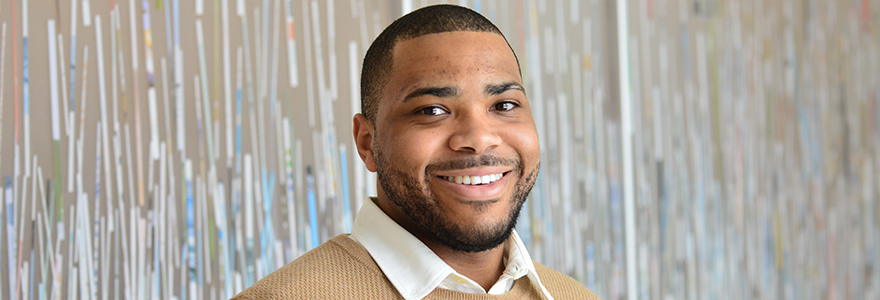A different lens
By Jennifer Parraga, BA’93
A few months into his Master of Public Health (MPH) degree and Cameron Sharpe is already feeling a shift in how he is considering systemic social problems and how he sees the world.
“All the teachings we’ve had so far and all the classes we’ve taken are helping me and all my classmates to really see and perceive the world in a different light,” he said.
Born in Kansas City, Missouri, Sharpe moved to Seattle, Washington at a young age with his parents and siblings. Travelling back and forth between the two states to visit his extended family, Sharpe began to see the differences in the quality of life people in different parts of the United States encountered.
“In the mid-west, you see how far people have to travel to get groceries or to see their doctors, compared to people living in urban centres like Seattle,” he said.
The inequities weren’t lost on him and ultimately served as a foundation for a growing interest in health equity and social justice.
With support from his parents, Sharpe began to explore his interests, including those in science, and began an internship with Dr. Beverly Torok-Storb, a stem cell researcher at Fred Hutchinson Cancer Research Center. Soon, Dr. Torok-Storb was mentoring Sharpe and encouraging him to first pursue a degree in science.
Sharpe headed to the University of British Columbia (UBC) to study science. Five years later, he found himself on Western’s campus, enrolled in the MPH program and feeling very much a part of the campus community.
“Instantly, I felt like I was part of the Western family and that I could achieve great things,” he said.
He says he knew right away that choosing the MPH program at Schulich Medicine & Dentistry was the right decision. The fact that the program is accredited by the Council for Education on Public Health was particularly appealing to Sharpe when he began his search, as it allows students to get their certification to work anywhere in the world. With experience in case-based learning from his high school, Sharpe also welcomed the opportunity to pursue a style of learning in which he excelled.
“You have to go in with the right mindset and really think about how you can improve as a person and use your skills to enhance the profession of public health,” he said.
Now solidly immersed in the program, Sharpe has also come to value and appreciate the learning teams both in and out of class.
“My learning team is very collaborative and we are always helping each other out. As a team we really push each other to see life through a different lens,” he said.
Case in point, Sharpe and his team ventured out to watch the movie Joker together. Afterward, their conversation became more of a brainstorming session about what public health interventions could have prevented the Joker character from following the path he did.
Sharpe also speaks highly about how engaged his professors are and how invested they are in each student’s success. What stands out for him the most, however, is the focus put on evidence-guided decision making and knowledge translation. Together, he says it all helps to build confidence in the students ensuring they are ready to positively impact the lives of people once they graduate.
Though the days are long and the amount of information can, at times, feel challenging to manage, he feels the Program is definitely worth it.
“The people in the MPH Program care about students as individuals,” he said. “Our professors talk to us about our lives and our dreams and what we want to do. They have tailored the curriculum to address issues we want to explore, and the administration looks after all of us. I’m really happy to be here.”









